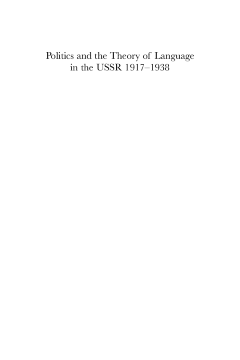
Additional Information
Book Details
Abstract
‘Politics and the Theory of Language in the USSR 1917-1938’ provides ground-breaking research into the relationship between linguistic theory and politics during the first two decades of the USSR. This work introduces some of the era's most notable figures whose achievements have been largely overlooked in the West, and provides a thought-provoking discussion of the innovative approaches they developed. Some of these insights still have a progressive role to play in scholarship today.
‘This succinct volume of articles straddles the interdisciplinary divide between history, political science, linguistics and literary studies […]. It opens a new vista for future research that will take into account the entire milieu of the interwar Soviet theoreticians and implementers of linguistic and social engineering.’ —Tomasz Kamusella, Cracow University of Economics, ‘European History Quarterly’ Book Reviews
'Politics and the Theory of Language in the USSR 1917-1938' provides ground-breaking research into the complex interrelations of linguistic theory and politics during the first two decades of the USSR. The work examines how the new Revolutionary regime promoted linguistic research that scrutinised the relationship between language, social structure, national identity and ideological factors as part of an attempt to democratize the public sphere. It also looks at the demise of the sociological paradigm, as the isolation and bureaucratization of the state gradually shifted the focus of research.
Through this account, the collection formally acknowledges the achievements of the Soviet linguists of the time, whose innovative approaches to the relationship between language and society predates the emergence of western sociolinguistics by several decades. These articles are the first articles written in English about these linguists, and will introduce an Anglophone audience to a range of materials hitherto unavailable.
In addition to providing new articles, the volume also presents the first annotated translation of Ivan Meshchaninov's 1929 'Theses on Japhetidology', thereby providing insight into one of the most controversial strands within Soviet linguistic thought.
‘This volume is a key contribution to the intellectual history of socially grounded studies of language, and it will be valuable to scholars interested in the place of theories of language in early Soviet politics, as well as to scholars examining the links between language, power, and society in general.’ —Laada Bilaniuk, University of Washington, in ‘Slavic Review’
‘This is an excellent volume with a set of extraordinarily thoughtful and insightful papers. It is an intellectual history and is of immense relevance to linguists and literary scholars alike as well as historians of the Soviet period.’ —Lenore A. Grenoble, University of Chicago, ‘The Russian Review’
Craig Brandist is Professor of Cultural Theory and Intellectual History and Director of the Bakhtin Centre at the University of Sheffield.
Katya Chown is Lecturer in Russian at Leeds University and Honorary Research Fellow at the University of Sheffield.
‘A very rich and captivating book on the history of the first phase of Soviet linguistics.’ —Roger Comtet, Université de Toulouse II, in ‘Historiographia Linguistica’
'Examining the interpenetration of linguistics, psychology, sociology and political thought, this collection makes an excellent interdisciplinary contribution to our knowledge of Soviet cultural and intellectual history.' —Galin Tihanov, University of Manchester
